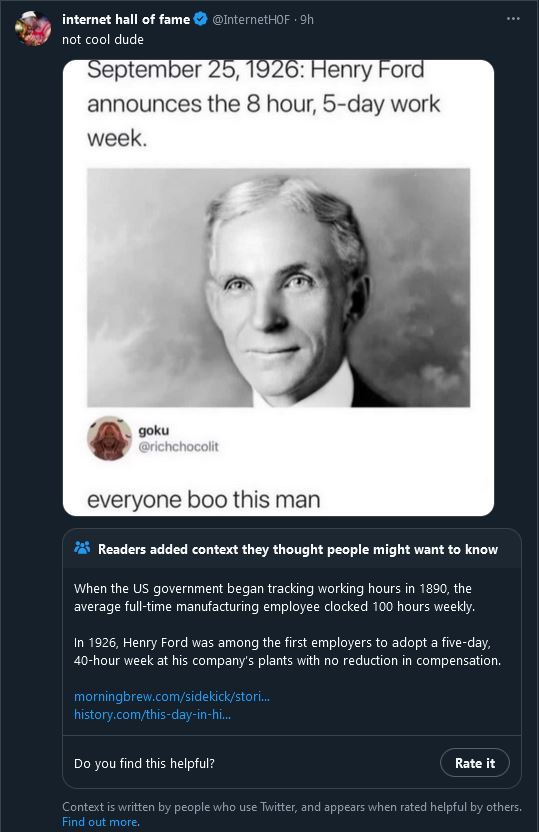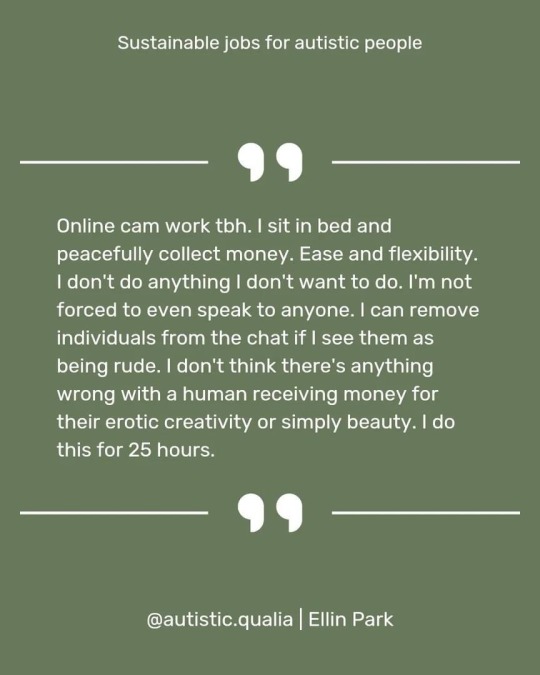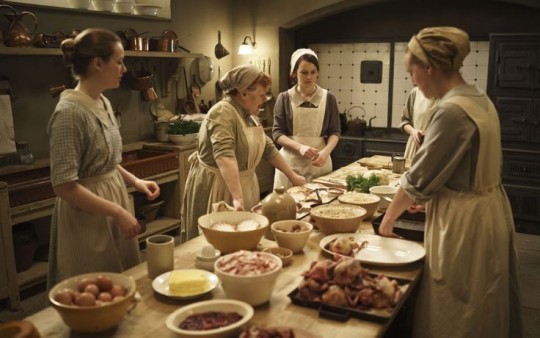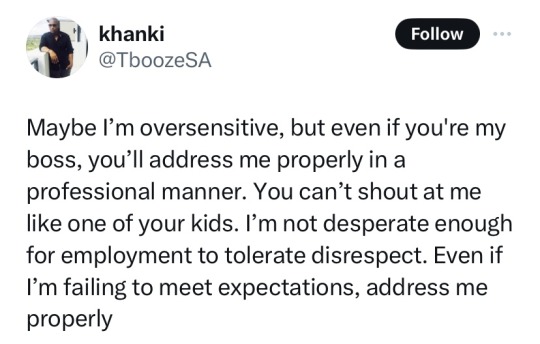#Employment
Text
Job interview tip I got from a tiktok but it's genius:
If you were unemployed for a while, they're going to ask if you can explain the gap in your resume. Unless you were actually doing something cool & relevant, this is hard to answer in a way that makes you sound like a good corporate cog. So here's the best and infallible answer -
No you cannot, because you signed an NDA.
You now sound mysterious, desirable, worldly, experienced. They can't even really ask you more about it! Perfect.
#obviously it is morally correct to lie on job applications/at interviews#level that playing field any way you can#employment#labor#job interview tips
45K notes
·
View notes
Text

9K notes
·
View notes
Text
Hiring managers acknowledge as much. In a survey of more than 1,000 hiring managers last summer, 27% reported having job postings up for more than four months. Among those who said they advertised job postings that they weren’t actively trying to fill, close to half said they kept the ads up to give the impression the company was growing, according to Clarify Capital, a small-business-loan provider behind the study. One-third of the managers who said they advertised jobs they weren’t trying to fill said they kept the listings up to placate overworked employees.
You've probably been in the position of sending out your resume far and wide, filling out zillions of applications, and going weeks or even months before even getting an answer. Well, turns out a lot of it's because they're not actually hiring anyone. It's not just you.
24K notes
·
View notes
Text
For example, a call center representative would answer “other customer service” even if they work for a healthcare company.
–
We ask your questions so you don’t have to! Submit your questions to have them posted anonymously as polls.
#polls#incognito polls#anonymous#tumblr polls#tumblr users#questions#polls about jobs#submitted dec 3#work#employment#employees#jobs
3K notes
·
View notes
Text
Help! I'm a Perfect Genius, but This Potential Employer Asked Me a Boring Interview Question!
Ask A Manager, 13 Feb 2024:
I was rejected from a role for not answering an interview question. I had all the skills they asked for, and the recruiter and hiring manager loved me.
I had a final round of interviews — a peer on the hiring team, a peer from another team that I would work closely with, the director of both teams (so my would-be grandboss, which I thought was weird), and then finally a technical test with the hiring manager I had already spoken to.
(I don’t know if it matters but I’m male and everyone I interviewed with was female.)
The interviews went great, except the grandboss. I asked why she was interviewing me since it was a technical position and she was clearly some kind of middle manager. She told me she had a technical background (although she had been in management 10 years so it’s not like her experience was even relevant), but that she was interviewing for things like communication, ability to prioritize, and soft skills. I still thought it was weird to interview with my boss’s boss.
She asked pretty standard (and boring) questions, which I aced. But then she asked me to tell her about the biggest mistake I’ve made in my career and how I handled it. I told her I’m a professional and I don’t make mistakes, and she argued with me! She said everyone makes mistakes, but what matters is how you handle them and prevent the same mistake from happening in the future. I told her maybe she made mistakes as a developer but since I actually went to school for it, I didn’t have that problem. She seemed fine with it and we moved on with the interview.
A couple days later, the recruiter emailed me to say they had decided to go with someone else. I asked for feedback on why I wasn’t chosen and she said there were other candidates who were stronger.
I wrote back and asked if the grandboss had been the reason I didn’t get the job, and she just told me again that the hiring panel made the decision to hire someone else.
I looked the grandboss up on LinkedIn after the rejection and she was a developer at two industry leaders and then an executive at a third. She was also connected to a number of well-known C-level people in our city and industry. I’m thinking of mailing her on LinkedIn to explain why her question was wrong and asking if she’ll consider me for future positions at her company but my wife says it’s a bad idea.
What do you think about me mailing her to try to explain?
Sir,
You have been wronged in the most grievous of ways by a coven of retaliatory, self-aggrandizing women who have failed in the extreme to recognize your brilliance, your talent, and above all, your general superiority.
Of course you should mail this mediocre "grandboss" on LinkedIn to inform her of the deep offense she caused you by interviewing you in the first place, let alone doing so using a boring question — indeed, you have a moral and professional obligation to do so in order to preserve your honor and the honor of scores of men like you who have never done a single solitary thing wrong in their lives, ever.
But I beg you to consider doing more. A single, private message to one incompetent bitch may not convey to the necessary parties the depth and breadth of the situation. Many, many people have important lessons to learn from your experience, and I encourage you to share it widely. Consider making a public LinkedIn post, and ensure that it is shareable across platforms. Depending on your financial resources, a billboard with your name, professional headshot, and contact information could go a long way toward ensuring that everyone in your industry who needs to know just how you handled the way these women treated you, does know about it.
I hope that in your continuing job search, you are able to connect with potential employers who have a much better grasp of all you bring to the table.
#advice#bad advice#ask a manager#workplace#workplace advice#linkedin#bosses#working#developers#coding#fedoras#men#misogyny#workplace misogyny#hiring#job searching#employment
2K notes
·
View notes
Photo

5K notes
·
View notes
Text

3K notes
·
View notes
Text
If you dream of handing in your two-week notice because you're dissatisfied with your job — you're not the only one.
A new report from recruitment firm Hays found that 71 per cent of Canadians are looking to quit their jobs within the next 12 months — the highest number the organization has ever seen. In 2022, 61 per cent of respondents said they wanted to leave their positions.
The firm warns that as the economy recovers, this trend will only get worse and managers should brace themselves for more resignations.
Full article
Tagging: @politicsofcanada
750 notes
·
View notes
Text
"Illinois will become one of three states to require employers to offer paid time off for any reason after Gov. J.B. Pritzker signed a law on Monday that will take effect next year.
Starting Jan. 1, 2024, Illinois employers must offer workers paid time off based on hours worked, with no need to explain the reason for their absence as long as they provide notice in accordance with reasonable employer standards.
Just Maine and Nevada mandate earned paid time time off and allot employees the freedom to decide how to use it, but Illinois’ law is further reaching, unencumbered by limits based on business size. Similarly structured regulations that require employers to offer paid sick leave exist in 14 states and Washington, D.C., but workers can only use that for health-related reasons.
Illinois employees will accrue one hour of paid leave for every 40 hours worked up to 40 hours total, although the employer may offer more. Employees can start using the time once they have worked for 90 days. Seasonal workers will be exempt, as will federal employees or college students who work non-full-time, temporary jobs for their university.
Pritzker signed the bill Monday in downtown Chicago, saying: “Too many people can't afford to miss even a day's pay ... together we continue to build a state that truly serves as a beacon for families, and businesses, and good paying jobs.”
Proponents say paid leave is key to making sure workers, especially low-income workers who are more vulnerable, are able to take time off when needed without fear of reprisal from an employer.
Bill sponsor Rep. Jehan Gordon-Booth, a Peoria Democrat, said the bill is the product of years of negotiations with businesses and labor groups.
“Everyone deserves the ability to take time off,” she said in a statement. “Whether it’s to deal with the illness of a family member, or take a step back for your mental health, enshrining paid leave rights is a step forward for our state."
“This is about bringing dignity to all workers," she said at the signing."
-via ABC News, 3/13/23
#illinois#jb pritzker#workers rights#labor rights#employment#paid leave#pto#sick leave#burnout#family leave#good news#hope
5K notes
·
View notes
Text
Sustainable Jobs for Autistic People









Autistic Qualia
#autism#actually autistic#employment#jobs for autistic people#sustainable development#job hunting#neurodivergence#neurodiversity#actually neurodivergent#feel free to share/reblog#Autistic Qualia (Facebook)
321 notes
·
View notes
Text
Fantasy Guide to A Great House (19th-20th Century)

(I know, I've been slacking but I'm still alive)
When we think of the Victorians, the grand old Gilded Age or the Edwardians, we all think of those big mansions and manors where some of our favourite stories take place. But what and who did it take to run a great house?
Meet the Staff

Large numbers of staff were always needed to run great houses. Every department had its own management and its own teams, all working together to ensure everything ran smooth. There was both an interior and exterior team.
Interior
You can split the interior of the household into three departments: Service, Upkeep and Food Preparation.
Service
Butler: The Butler was the Head of all the household staff. He acted essentially as the manager of a great house, directing the staff on a day to day basis or at events on the command of the lord/lady/employer. Make staff would report mostly yo him and he would be in charge of keeping an eye on them. The Butler had charge of the wine cellars, the dining room, sometimes the pantry as well. As the manager of the house, Butlers were afforded the title of Mr. X. Our favourite examples being of course Mr Carson and Mr Pennyworth.
Valet: The valet was the male servant who handled the dressing of the men of the family. He would be in charge of his master's clothes, ensuring he was always dressed in the right outfit for the right activity (there was a lot) and be in charge of helping him into the outfit in question. The valet would also be in charge of cleanliness, sometimes shaving his master or running his bath. Valets were referred to as Surname and ranked in how their employer's ranked, for example the Lord’s valet would outrank his son's.
Lady's Maid: The lady's maid was similar to the valet. She was in charge of keeping the ladies of the house looking their best and handling their needs. She would style hair, care for jewels, mend clothes, care for clothes and often act as a companion, accompanying her lady on visits or day's out. The lady's maid was referred to by their surname.
Footman: The footman was a male servant who served at table, fetched items, handled heavy lifting such as luggage, opened and closed doors. Most footmen were young men and en chosen for good looks. Footmen polished the silver services at great houses and when called upon would often take on the role of valet to guests without a servant to help. Footmen were referred to as their firstname. Footmen were denoted by rank, the highest being first footman who had charge over the others and would assist the butler in some tasks.
Upkeep
Housekeeper:The housekeeper was second in command but she ran her most of the interior staff, especially those who took care of the house itself. She supervised all female staff. She helped the lady of the house when it came to running events and caring for guests. The housekeeper is always Mrs. Surname even when she's unmarried.
Housemaid: Housemaids clean the house. They would dust, make and strip beds, straighten things up and keep the house looking it's best. The housemaid was a servant that was almost never seen, usually rising early, lighting the fires, cleaning the house as the family moves from room to room. She was called by her Firstname.
Scullery Maid: The scullery maid is the lower ranking maid. She would also have been younger and less experienced. She was in charge of the more unsightly work: laying the fires, scrubbing the floors, emptying chamberpots, cleaning servant's chambers. She may even do mending and washing for other servants. She was called by her first name.
Hall boy: The hall boy was also young and handled the worst jobs. He would polish boots belonging to the family and sometimes staff, cempty the servant's chamberpots and waited on on the higher ranking servants. He was called by his name.
Food Preparation
Cook: The cook or chef was the third highest ranking servant downstairs and they ran their own department. They were in charge of the kitchen staff. All cooks and chefs would meet almost daily with the lady of the house to discuss menus and ordering but would answer to both housekeeper and butler. As with the housekeeper, a female cook or chef is Mrs Surname despite martial status and make cooks/chef are Mr.
Kitchen maid: The kitchen maid helped the cook/chef in preparing the food. She would be one of the first servants up, in charge of lighting the ovens and starting the breakfast for the family and servants. She would clean the kitchen, boil water when needed and bring food up to the servery when needed. She would be called by her first name.
Exterior
The house would needed a team on the outside to handle the stables, the gardens and any outdoor activity.
Gardeners: They would be responsible for the upkeep of the grounds itself, caring for the gardens. There would be multiple at a great house led by a head gardener.
Stableboy/groom/kennelmaster: They would take care of the family's horses and dogs. They would take care of tack, help plan hunts and riding pursuits and handle carriages.
Chauffeur: As automobiles became popular in this period, a chauffeur was needed to drive the family and take car of their motor.
Lives of Servants

Servants were paid very little at this time, mainly because most staff got free room and board. Most of the interior staff would live in the house itself and be supplied meals. Chauffeurs, gardeners etc would live nearby on the estate either as locals or be supplied a house as a staff member. Staff uniforms were also supplied. Days off were rare but not withheld. Permission was needed to leave the house either to visit the shop or take a few days off.
Servants were expected to be obedient, modest and humble at all times. They were expected to stand in the presence of their master's, speak only when spoken to and never question an order. They had to be ready for anything at the drop of a hat. You've set for a dozen guests but now there's five more coming? Tough luck, change the table settings. You get seasick? Nevermind that, your gentleman is going across the sea and as his valet you're going with him, like it or not.
Servants from one house often travelled to with the family to their other residences: the butler, footmen, chef, kitchen maids, lady's maid, valet would all go with the family while everybody else would get left behind. Every house would have its own housekeeper if it could be afforded. Housemaids and other staff needed could be hired locally when needed.
The Daily Routine

The working day of a servant in a grand house was a long arduous one.
Morning: At 6am, the servants rise. The scullery maid gets up and begins lighting the fires, starting with the kitchen. Then she cleans the kitchen top to bottom before the staff get in to cook. The kitchen maid would rise at the same time, helping with the cleaning. She would set for the servant's breakfast and start cooking it. The footmen open the shutters upstairs, cleans whatever tools they will need such as glasses and silverware, tend the lamps and sets for breakfast upstairs. The housemaids go about the house cleaning up after the night before, starting in the rooms that aren't being used (any room that's not the bedrooms). At around 8, the cook rises and starts the day. The kitchen maid serves breakfast to the other servants before returning to the kitchen to eat her own breakfast with the other kitchen staff. After breakfast, the housemaid will change her apron and deliver hot water to each of the bedrooms for the family. At 9, the family rise. Married women have breakfast in bed with all other family members and visitors eating in the dining room. Valets and lady's maids would have dressed them prior, gathering up any clothes to be mended or washed. The footmen and butlers will serve while the housemaids go into each empty room and begin their chores.
Midday: Just before midday, the chef would speak with the lady of the house to discuss menus. At around 11, the staff were permitted their first break, just enough time for a drink usually a cup of tea before they started again. The chef would start preparing for the main dinner of the evening with the lady's approval. Footmen would take their places at entrances or attend the family where he may be needed. At noon, the servants would have their dinner. At 1, the family would sit for their lunch. Once lunch is over, a footman might be permitted to attend personal business (with permission from the butler first) or be sent on errands out of the house such as delivering messages. While the family sit for breakfast, the maids tidy up any room they have been using since getting up.
Afternoon: The family take tea around 4. The footmen clear the tea before heading down to take their tea - a light meal- with the other servants around 5. Afterwards, the footmen will start to light the lamps, close the shutters and draw the curtains. The butler would oversee the laying of the table for dinner with the footmen. The first footman carries the silver, the second the china, while the butler sets the silver and glasses. If a guest is coming, a footman will remain on the door to see them in.
Evening: At 8, the footman or butler signals the start of supper. This is done by the rinibg of the gong or bell which gives the family and any staying guests, 15mins or more to get ready. Valets and lady's maids would already be upstairs at this point, helping their master/mistress. When the family head downstairs, they linger in the drawing room to chat while a footmen keeps an eye on them. Any guests visiting for dinner would be let in by a footman and announced upon entry. The butler announces dinner and escorts the family in. The footman serve the food while the butler pours the wine (chosen by the Lord with the butler's help). The footman stay in the dining room all throughout dinner, excepting when they go to the servery to collect the food from the kitchen maid. They serve and clear the plates for every course. When dinner is over, a footman will stay with the men while they drink their port while another serves the ladies their coffee in the drawing room. While dinner is on, the housemaid would tidy the empty rooms, check the fires and turn down the beds. At 9, the servants eat their supper while the family chill. When supper is over and the family is done for the night, the valets and lady's maids would ready their masters for bed. A footman would wait in the hall with candlesticks for the family and show any departing guest out. The kitchen staff would start to clean up while the butler starts locking up the house. The staff would get to bed about 11:30 - 12.
#Fantasy Guide to A Great House#Guide to A Great House part 1#Staff#Employment#Historical reference#Writing reference#writeblr#Writing help#Writers guide#Writing research#writers resources#writing resources writing advice#Writing advice#19th century#20th century#Edwardian#Gilded age#Victorian era
2K notes
·
View notes
Text

8K notes
·
View notes
Text
HEY our studio is unionizing and I couldn't be more anxious and excited!! So proud of my fellow employees for taking the big leap together!!
PUTTING THE "POWER" IN POWERHOUSE!!!

2K notes
·
View notes
Text
We ask your questions so you don’t have to! Submit your questions to have them posted anonymously as polls.
#polls#incognito polls#anonymous#tumblr polls#tumblr users#questions#polls about jobs#submitted nov 29#jobs#work#employment#unemployment#unemployed
657 notes
·
View notes
Text
If you’re autistic in the professional world, you’re stuck with two options:
1. Don’t disclose you’re autistic and try to mask and risk losing your job when you inevitably fail to live up to allistic expectations
2. Disclose you’re autistic and risk being treated with kiddie gloves, possibly up until you’re driven out of the job by the condescending environment
You literally can’t win. You’re treated like your incompetent or lazy on the one hand, or like your (very reasonable!!) communication needs are massive inconveniences on the other. (I literally just communicate what I need and mean rather than trying to decode communication games in this edition of Professional Sims™️!)
The ideal would be to work around other autistic and/or disabled people, I guess. But even then, often in order to get there you have to go through a gauntlet of jobs and educational systems that are straight up not made for autistic people.
No wonder so many of us remain unemployed.
#autsitic#autism#actually autistic#neurodivergence#neurodivergent#neurodiversity#disability justice#disability rights#disability#disabled#venting#employment#autistic things#autistic adult
393 notes
·
View notes
